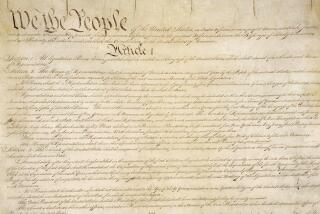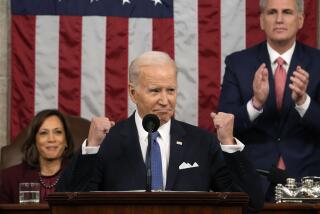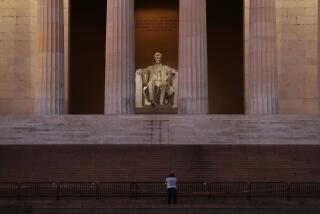Bringing us together
It is America’s great fortune that it fell to Abraham Lincoln to articulate the nation’s need for healing after the Civil War. Lincoln gave us our exemplar of principled conciliation, most movingly and memorably expressed in his second inaugural address, properly regarded as among the most important speeches in our history. “Let us strive on to finish the work we are in,” Lincoln implored, “to bind up the nation’s wounds.”
The divisions in our country today are less pronounced than those Lincoln confronted, but they are significant. No longer sectional or blood-soaked, they nevertheless are ideological, partisan and cultural. They reflect an often bitter and surly populace. We encounter that anger in the mean-spirited anonymity of the Internet and the decline in civility in our everyday lives. We reel from it in displays as shocking as the cry from the crowd at a campaign rally demanding the death of a political opponent.
The task of repairing those divisions will fall to one of two men -- or, rather, to one of two tickets. And the question for those who care about such things thus becomes: Will Barack Obama and Joe Biden do more to reconstruct a culture of mutual regard, or will John McCain and Sarah Palin fare better?
As is often the case in this election, Obama has a more promising but more limited record. His message is one of unity, and his own life provides evidence that he means it. He is physical testament to the bridging of our ethnic divides, and he gracefully calls on America to heal its wounds. Addressing the persistent power of race to separate us, he said last spring: “To simply wish it away, to condemn it without understanding its roots, only serves to widen the chasm of misunderstanding.”
As a young politician in Illinois, Obama won admirers among both Democrats and Republicans, whites and blacks. His agenda today is far more Democratic than Republican, but he does not demonize his opponents. Even as he has challenged McCain’s judgment -- for supporting the war in Iraq or joking about bombing Iran -- he has praised his military service and bravery. “For that,” he said in his acceptance speech at the Democratic convention, “we owe him our gratitude and respect.” Indeed, it says something troubling about our society that Obama has been widely criticized by Democrats for acknowledging that he occasionally agrees with his opponent.
For McCain, the record is almost exactly the opposite. He has genuine credentials in bipartisanship. He supported campaign finance reform when his party leaders disparaged it. He defied his party’s president in considering whether the United States had any business sanctioning torture. And he broke with the more extreme elements of Republican populism in supporting comprehensive immigration reform. Those positions helped earn him the “maverick” label now central to his candidacy. We have commended him for them.
The problem is that while McCain is still trumpeting those positions, he has abandoned them. He denounced torture as a senator but equivocated as a candidate, refusing to support legislation that would hold the CIA to the same interrogation guidelines used by the U.S. military. He sponsored immigration reform as a senator, then announced as a candidate that he would no longer support his own bill. He has studiously avoided eye contact with Obama during their debates, and at one point referred to him not by name but merely as “that one.” Whatever else one reads into that remark, it cannot be regarded as respectful. Political expediency is no substitute for leadership. Certainly, it’s not the mark of a maverick.
Then there are the candidates for vice president. For his choice of running mate, Obama selected a verbose and malapropistic congressional colleague who sometimes trips over himself trying to make a point. And yet Biden is a veteran member of the Senate, respected by both parties. He is honest, steady and a proven leader steeped in foreign affairs. It is terrible to imagine the need for a vice president to step up to the presidency in an emergency, but it is comforting to know that Biden could do so.
By contrast, McCain’s choice was cynical and undercuts his own claims to moderation, as even McCain seems to know. Time and again in the second debate, he cited his friendship and cooperation with Sen. Joe Lieberman, the former Democrat who now straddles the parties as an Independent. But McCain sought to extract advantage from that association even though he passed over Lieberman in favor of Palin. With that decision, McCain rejected a bipartisan political veteran in favor of an unqualified neophyte -- one prone to divisive rhetoric -- in order to placate his party’s right wing. Palin brought us “drill, baby, drill,” this year’s polarizing and vulgar bit of political speech. McCain then unleashed Palin to tear down Obama, and she responded by suggesting that Obama liked to “pal around” with terrorists. Palin’s boast that “the heels are on, the gloves are off” is just too embarrassing to warrant response.
McCain since has tried to cool off his supporters, but he lit this fire -- he and no one else is responsible for those who shriek at Palin’s rallies, who proclaim that Obama is an Arab and who wish him harm. This campaign is more crass and more virulent because McCain made it so. That Palin has ended up alienating not only moderates but also conservatives is this race’s enduring irony.
On the question of who will best bind up this torn nation, we are far more troubled by what we know about McCain than what we don’t know about Obama. It is proper to admire McCain’s service to his nation -- as a military man and as a senator -- and he deserves our respect. On the question of who best can reunite us, however, we cannot put our faith in a man who has done so much to drive us apart.
This is the third editorial in a weeklong series on the issues and challenges facing the next president. The full series is available at latimes.com/positionpapers.
More to Read
A cure for the common opinion
Get thought-provoking perspectives with our weekly newsletter.
You may occasionally receive promotional content from the Los Angeles Times.






